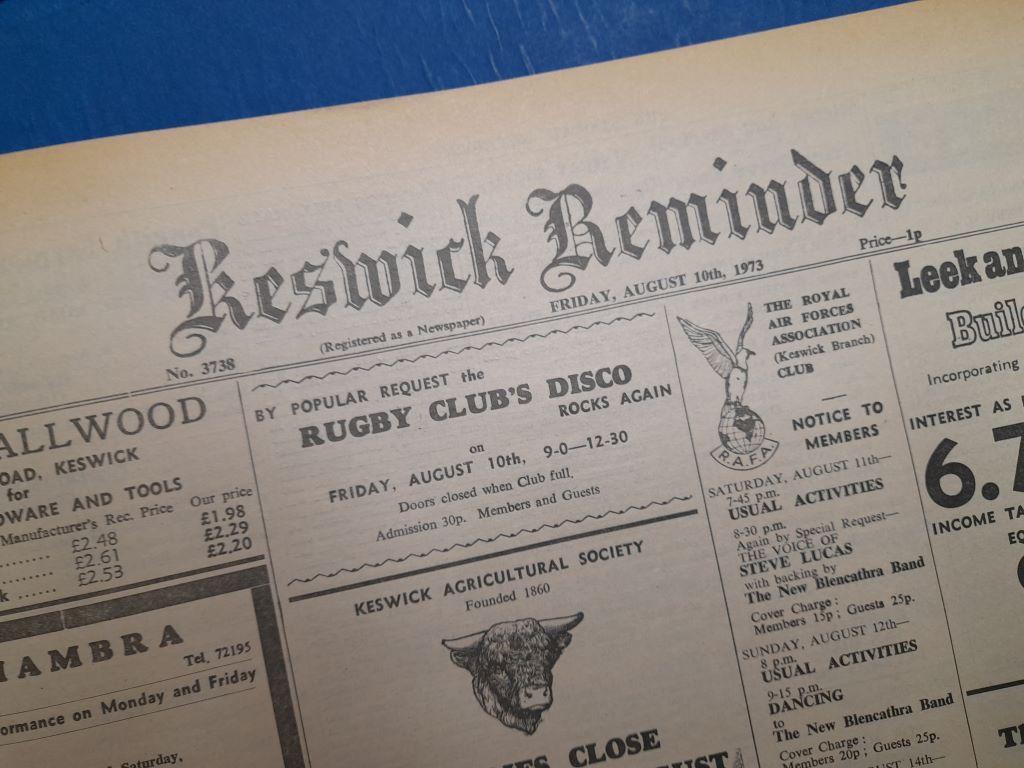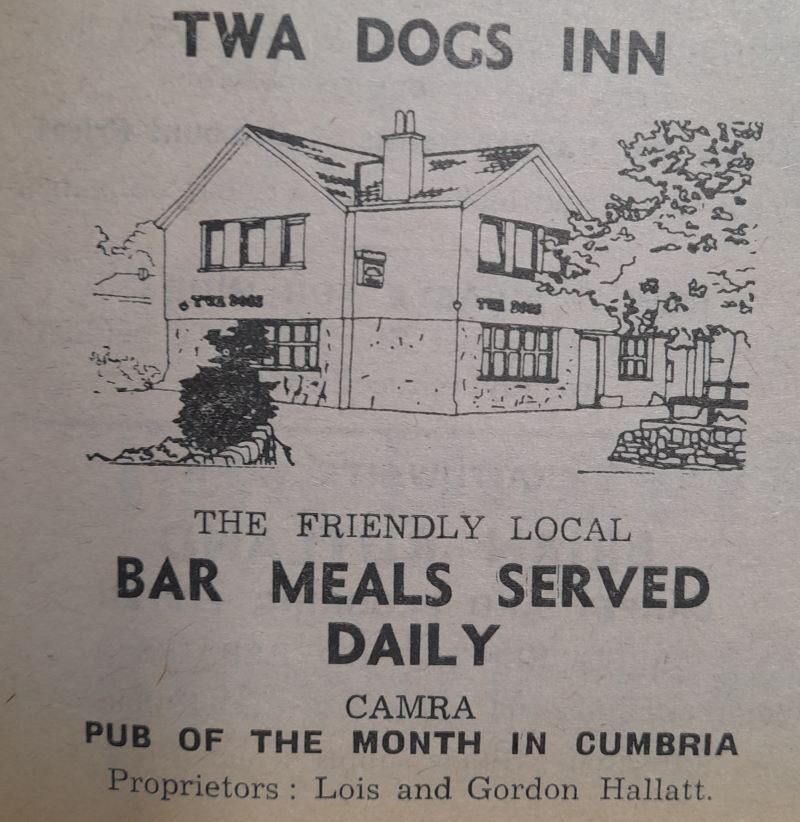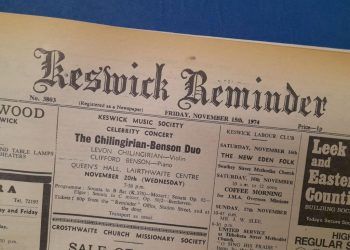
Looking back through the archives of The Keswick Reminder from around this week 20, 30, 40 and 50 years ago.
20 years ago
Poets’ windows
Keswick’s famous poets’ windows which used to be part of the Royal Oak Hotel and are now incorporated into the town’s Jobcentre, have been sent away for restoration.
There has been a great deal of concern that the sudden disappearance of the windows meant they had gone for good, but Jobcentre manager Katy Fitzpatrick says they will be back in a matter of weeks after some restoration by a firm of experts in Lancashire when they will be given new frames and leading, and restoration of the glass.
A member of the Jobcentre staff first noticed that cracks in the windows were getting larger and the lead holding them in place was softening.
A steady stream of local residents has been making enquiries about the windows which commemorate the poets Robert Southey, William Wordsworth, Hartley Coleridge, Samuel Taylor Coleridge, John Ruskin and John Peel. The Thomas de Quincey is in good condition and not in need of restoration.
The Jobcentre is in the former dining room of the old coaching inn. The Royal Oak was redeveloped in the late 1980s; part was turned into flats and another area was incorporated into the Packhorse Court shopping centre.
Police cones
Police have appealed for the return of police cones, loaned to residents over the period of Keswick Convention. Anyone who still has cones is asked to take them to the police station or to phone the police and ask for them to be collected.
A police spokesman said: “Many have been collected, however we heard of one instance where the cones have been kept for three years. They must be returned.
Letters to the Editor
Dear Editor,
I am writing to protest in the strongest possible terms at the continued and unabating rape, day after day, of our beautiful Derwentwater and Bassenthwaite Lakes by the screaming jet aircraft of the RAF. Surely we have someone in authority who can stop this abomination of the shattering of the peace and quiet for which residents and our very welcome visitors are entitled?
My husband and I often speak to visitors in Crow Park and by the Lake and they are appalled at the awful racket overhead. On Thursday 17 July we were subjected to 12 low flying sorties. On the 4th August there were 17 sorties right up to 17.15 pm. Awful! They come in groups of 2 or 3 chasing each other across the mountains. How soon will there be another accident?
On a personal note I have suffered for 48 years from a very severe inner ear condition called Meniere’s Disease, and the constant and unabating abomination has deteriorated my health to its lowest ebb. At 87 years of age I and many others deserve more consideration.
Ellen Crowson
The Heads
Keswick
P.S. I have just watched the 6.30 news on television to be told there was a near disaster over the North East recently – one of these jets nearly hit a passenger plane – they must be stopped.
30 years ago
Pioneer ranger retires
Des Oliver has retired from his post as a National Park warden. One of the Lake District’s pioneer rangers, he joined when there were just two wardens covering the entire Lake District National Park, and he is the Park’s longest serving ranger.
Born and brought up in Keswick, Des developed his love of the hills as a boy with fell walking outings. He was persuaded to join the voluntary wardens by John Wyatt who, at that time, worked alone across the entire area. A couple of years later the second warden’s post was created and Des was appointed.
He recalls: “I had all the right credentials for the job and I lived in Keswick which I think tipped the scales in my favour.”
He became warden for the northern half of the Lake District more than thirty years ago. In those early days there were two wardens, an information centre and a caravan which the wardens towed around to inform people about their role. One of the ideas they pioneered was guided walks and Des Oliver actually led the first guided walk arranged by the National Park – a walk he repeated on his final day at work!
Fell races
Gavin Bland, a member of the celebrated Borrowdale family of fell runners, won the 18 mile rugged Borrowdale Fell Race on Saturday.
The race, which starts and finishes at Rosthwaite, covers some of the most scenic and tough mountain terrain in the Lake District and includes England’s highest peak, Scafell Pike, Great Gable and Dale Head.
Simon Booth, another member of the Borrowdale Fell Runners club, came second and the Borrowdale club took the team prize.
In fact the race was something of a Borrowdale Fell Runners benevolent race. Third place was taken by Jonathan Bland, Billy Bland was 4th and first over 40, Andrew Schofield was 6th and Dave Wilkinson 7th. Dave Hicks came 14th, Peter Bland (Gavin’s younger brother) was 23rd, and Ian Turnbull 56th.
Keswick Athletic Club’s first finisher was Colin Valentine in fifth place.
Traffic proposals
Details of the timetable for implementation of the measures contained in the Keswick Traffic Management plan have been given by the County’s Chief Engineer, Bob Allen.
Mr. Allen expects the traffic regulation orders to become operational in October. A second phase of regulation order proposals concerning Southey Street, The Heads and the Central Car Park access road, are expected to be implemented next February.
The Main Street/Tithebarn Street experimental mini-roundabout will now be installed in October together with the temporary pedestrian refuge in Tithebarn Street. This is later than was originally planned, but Mr. Allen said it would help the operation of this junction if the access restriction on Main Street between Bank Street and Derwent Close was in force, and this is one of the orders which should be introduced in October.
40 years ago

Letters to the Editor
Dear Editor, — I thought your readers would be interested in some information I found about the floating island, which is now present on the lake.
In the last hundred years, the times of its appearance have been as follows: In 1808, 20th July to the beginning of October; in 1813, 7th September to the end of October; in 1815, 5th to the end of August — on the 21st it measured 88 yards in length and 25 in breadth; in 1819, 14th to the end of August; in 1824, 21st June to the end of September; in 1825, 9th to the 23rd of September; and in 1826, 11th July to the end of September; the uncommon circumstance of its appearing in three successive years, may be due to the warmth of the seasons.
It rose above water again on the 10th of June, 1831, and remained uncovered till the 24th
September, being the longest period ever remembered; although its dimensions have been larger. In 1834 and 1835 it was above water, for a few weeks in each year, in August and September; and in 1837 in July and August. In 1841, 19th July until the beginning of the following month. In 1842 it appeared on the surface the 1st September; on the 14th it was upwards of 90 yards in length, and in places upwards of 20 in breadth, it then disappeared on the 8th of October.
In 1846, after unusual temperatures, it was above water from the 23rd of June to the 2nd of July, since then its movements have scarcely been sufficient to attract attention.
Darran Litt Wilson
Vicarage Hill
Keswick.
Fell race weekend
Ken Stuart’s ambition to become British “Fell Runner of the Year” is close to realisation. A gardener with the Town Council, he took a giant stride towards realising his aim on Saturday when he won the 18 mile Borrowdale classic.
That victory, in one of the top events of the fell running calendar, extended his lead in the Fell Runner of the Year championship table with twelve events now gone.
Ken finished ahead of his arch rivals John Wild and Billy Bland and now has a 36 points cushion in his bid for the sport’s blue riband. In fact Keswick team-mate Jon Broxap is now the closest challenger, with Wild third. Wild, who runs for Cumberland Fell Runners but is based in the R.A.F. in the Midlands, is the reigning Fell Runner of the Year and was second on Saturday.
Owl
A sixteen year old Keswick boy has successfully raised a Tawny Owl which he found fallen from its nest at Thornthwaite when it was only a few days old.
Mark Montgomery of Trinity Way last week-end sent the bird, which he called Toto, to a Hawshead animal lover who will train it to hunt its own prey then release it back into the wild.
The owl was just a “bundle of fluff” when Mark found it near Thornthwaite Forest. At first he fed it on mince with tweezers, but later it graduated to mice, caught on nearby allotments, and steak. The owl became very tame, sitting on Mark’s hand and shoulder and had virtually a free run of his house, swooping down on the family Springer dog Blake as though he were a new playmate.
Mark’s father, Mr. Tony Montgomery stressed: “I would not advise people to take young birds home unless they know a bit about it. Tawny Owls are protected and must be returned to the wild. They aren’t pets.”
Mark, who goes to Keswick School and would like to make a career working with animals, is a keen nature lover and frequently brings home abandoned and injured birds which he looks after with great care then returns to their natural habitat, Last year he raised seven jackdaws, and nearly all of them survived to fly off.
50 years ago

Death of Commander F. M. Fox
Commander Frederick Middleton Fox of Fawe Park, Portinscale, who died in Keswick Hospital on Sunday evening at the age of 81, had served his country and his county in many ways, not least through his Naval career.
Educated at Wellington College, he entered the R.N.V.R. in 1912 as a Midshipman, and, during the 1914-18 war, played an eventful role in the newly-emerging aviation branch of the service. One of the first pilots to take off from a ship — from improvised runways over the gun turrets of a cruiser — he served on the first aircraft carrier, H.M.S. “Furious,” and he was also one of the early airmen to be credited with a hit on a zeppelin.
He returned to active service when the second world war broke out and, after being stationed in Belfast and the Thames Estuary, went abroad and was a Staff Officer in Rome and Naples.
In peace-time Commander Fox was keenly interested in Civil Defence as Chairman of the County Committee and Controller Designate for the Cumberland Group and he was awarded the O.B.E. for his services in 1962. He was a Deputy Lieutenant of Cumberland and was High Sheriff in 1957/58. Commander Fox was also County Director for nineteen years of the Cumberland Red Cross and at the time of his death was a Governor of Derwent School, Cockermouth.
He had a lifelong interest in angling and had been a member of the Derwent Fisheries and of the Cumberland River Board which he represented on a national committee. Commander Fox also founded the Keswick Sea Cadets which he ran for a number of years.
Mrs Helen Fox, who survives him, is also well-known for her public work. She had known Commander Fox from schooldays through friendship with his sisters and they were married in 1918.
Roman Fort
The re-alignment of the A66 road between Keswick and Penrith is the main reason for an urgent excavation of a Roman Fort at Troutbeck.
The excavation is being undertaken by the archaeological department of Manchester University, and the site is adjacent to the present main road on the Keswick side of the Ullswater/Matterdale junction, Both the present A66 and the proposed new road cross the site of the Roman camp.
The work done by the University at this old site will add to the information acquired in recent years on the Roman occupation of Cumbria. It is thought that this camp was linked by road with the Roman camp of Voreda, situated near Plumpton (Penrith).








